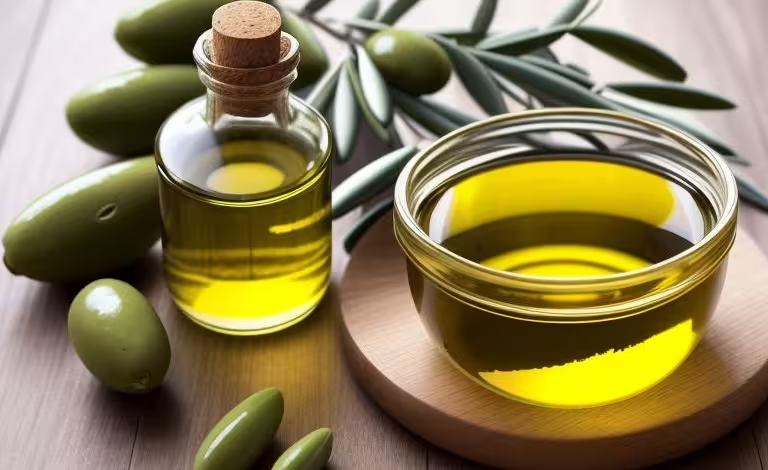
10 Amazing Benefits of Olive Oil on an Empty Stomach
Have you ever heard about the magic of olive oil on an empty stomach? This golden liquid, a staple in the Mediterranean diet, is not just for cooking. Consuming olive oil first thing in the morning can work wonders for your health. From aiding digestion to boosting heart health, olive oil has some fantastic benefits that you might not be aware of. Let's dive into the world of olive oil and see why you should consider starting your day with a spoonful of this liquid gold.

What Makes Olive Oil Special?
Olive oil is packed with healthy fats, antioxidants, and vitamins that are essential for your body. It's primarily composed of monounsaturated fats, which are known for their heart-healthy benefits. Moreover, it contains powerful antioxidants like vitamin E and polyphenols, which help fight inflammation and protect your cells from damage. The high concentration of oleic acid and its anti-inflammatory properties make olive oil a superstar in the health world.
1. Boosts Digestive Health
Starting your day with olive oil can do wonders for your digestive system. It stimulates the production of digestive enzymes and promotes the absorption of nutrients. Olive oil also acts as a natural laxative, helping to regulate bowel movements and prevent constipation. This can be especially beneficial for people who suffer from chronic digestive issues.
How to Use
Simply take one tablespoon of extra virgin olive oil on an empty stomach. You can follow it up with a glass of warm water with lemon for added benefits.
2. Supports Heart Health
Olive oil is well-known for its heart-protective properties. Regular consumption can help lower bad cholesterol levels (LDL) while raising good cholesterol levels (HDL). This balance is crucial for maintaining a healthy heart and preventing cardiovascular diseases. The antioxidants in olive oil also help reduce inflammation and improve blood vessel function.
How to Use
Include olive oil in your daily diet by using it as a dressing for salads, drizzling it over cooked vegetables, or even adding it to smoothies.
3. Enhances Skin Health
Your skin can greatly benefit from the antioxidants and healthy fats found in olive oil. These nutrients help to moisturize and nourish the skin, giving it a natural glow. Olive oil also has anti-aging properties, reducing the appearance of wrinkles and fine lines.
How to Use
Massage a small amount of olive oil into your skin in the morning and before bed. You can also add a few drops to your daily moisturizer.
4. Aids in Weight Loss
It might sound counterintuitive, but consuming olive oil can actually help you lose weight. The monounsaturated fats in olive oil help you feel fuller for longer, reducing the urge to snack throughout the day. Additionally, olive oil can boost your metabolism, making it easier to burn calories.
How to Use
Take a tablespoon of olive oil on an empty stomach and wait at least 15 minutes before eating breakfast. This can help control your appetite and set the tone for healthy eating throughout the day.
5. Improves Brain Function
Olive oil is beneficial for your brain too! The healthy fats and antioxidants in olive oil can improve cognitive function and protect against neurodegenerative diseases like Alzheimer's. Regular consumption of olive oil has been linked to better memory and overall brain health.
How to Use
Incorporate olive oil into your daily diet by using it in cooking or as a dressing for salads. You can also take it straight on an empty stomach for an extra brain boost.
6. Strengthens Immune System
Olive oil is rich in antioxidants and healthy fats that can boost your immune system. These nutrients help to fight off infections and keep your body strong and healthy. Regular consumption of olive oil can improve your body's ability to resist illness.
How to Use
Start your day with a tablespoon of olive oil to give your immune system a natural boost. You can also mix it with a bit of honey for added benefits.
7. Regulates Blood Sugar Levels
For those managing diabetes or blood sugar issues, olive oil can be a helpful addition to your diet. The healthy fats in olive oil help to regulate blood sugar levels and improve insulin sensitivity. This can be particularly beneficial for people with type 2 diabetes.
How to Use
Take a tablespoon of olive oil on an empty stomach to help stabilize your blood sugar levels throughout the day. Include it in your meals to maintain consistent blood sugar control.
8. Reduces Inflammation
Chronic inflammation is linked to various health problems, including heart disease, cancer, and arthritis. Olive oil is packed with anti-inflammatory compounds that can help reduce inflammation in your body. The oleocanthal compound in olive oil has been shown to have similar effects to ibuprofen, a common anti-inflammatory drug.
How to Use
Incorporate olive oil into your daily diet by using it in cooking or as a finishing oil on your dishes. You can also take it directly on an empty stomach for maximum anti-inflammatory benefits.
9. Promotes Liver Health
Your liver plays a crucial role in detoxifying your body. Olive oil can help support liver function and promote detoxification. The healthy fats in olive oil can help to flush out harmful toxins and improve liver function.
How to Use
Take a tablespoon of olive oil mixed with lemon juice on an empty stomach to help cleanse your liver. Do this regularly to maintain a healthy liver.
10. Improves Bone Health
Olive oil can also be beneficial for your bones. It helps improve calcium absorption, which is essential for maintaining strong and healthy bones. Regular consumption of olive oil can help prevent osteoporosis and improve bone density.
How to Use
Include olive oil in your diet by using it in cooking or as a salad dressing. You can also take it straight on an empty stomach for added bone health benefits.
Conclusion
Incorporating olive oil into your daily routine, especially on an empty stomach, can offer numerous health benefits. From improving digestion and heart health to boosting your immune system and brain function, this simple habit can have a significant impact on your overall well-being. So why not start your day with a spoonful of this liquid gold and experience the magic of olive oil for yourself?
Frequently Asked Questions (FAQs)
1. Can I take olive oil on an empty stomach every day?
Yes, you can take olive oil on an empty stomach every day. It is generally safe and can offer numerous health benefits. However, it's always best to consult with your healthcare provider before making any significant changes to your diet.
2. What type of olive oil is best for consumption on an empty stomach?
Extra virgin olive oil is the best choice for consumption on an empty stomach. It is the least processed form of olive oil and contains the highest levels of antioxidants and beneficial compounds.
3. How much olive oil should I take on an empty stomach?
A common recommendation is to take one tablespoon of olive oil on an empty stomach. However, this can vary depending on individual needs and preferences. It's best to start with a smaller amount and gradually increase it if needed.
4. Can taking olive oil on an empty stomach help with weight loss?
Yes, taking olive oil on an empty stomach can help with weight loss. The healthy fats in olive oil can help you feel fuller for longer, reducing the urge to snack throughout the day and boosting your metabolism.
5. Are there any side effects of taking olive oil on an empty stomach?
Most people can consume olive oil on an empty stomach without any issues. However, some individuals may experience mild digestive discomfort or diarrhea. If you experience any adverse effects, it's best to reduce the amount or stop taking it and consult with your healthcare provider.
6. Can I mix olive oil with other ingredients when taking it on an empty stomach?
Yes, you can mix olive oil with other ingredients like lemon juice or honey for added benefits. Lemon juice can enhance the detoxifying properties of olive oil, while honey can provide additional nutrients and improve the taste.
7. How long should I wait to eat after taking olive oil on an empty stomach?
It's recommended to wait at least 15-30 minutes after taking olive oil on an empty stomach before eating. This allows the oil to be absorbed properly and maximize its benefits.
8. Can children take olive oil on an empty stomach?
While olive oil is generally safe for children, it's best to consult with a pediatrician before giving it to them on an empty stomach. The dosage and frequency may need to be adjusted based on the child's age and health needs.
9. Can I take olive oil on an empty stomach if I have a medical condition?
If you have a medical condition, it's important to consult with your healthcare provider before taking olive oil on an empty stomach. They can provide personalized advice based on your health status and needs.
10. What are some other ways to incorporate olive oil into my diet?
Aside from taking it on an empty stomach, you can incorporate olive oil into your diet by using it in cooking, as a salad dressing, or drizzling it over vegetables and grains. Olive oil can also be added to smoothies or used as a dip for bread.
Incorporating olive oil into your daily routine can offer a multitude of health benefits. Start your day with a tablespoon of extra virgin olive oil and enjoy the journey to better health and well-being!
Subscribe Now
Enroll for our free updates

Thank You for Subscribing
Thanks for Updating Your Information



